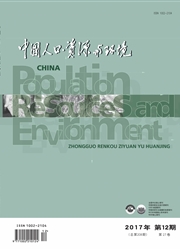

 中文摘要:
中文摘要:
从上世纪90年代起,中国在全国和各区域范围内实施了大量以生态补偿为理论基础的环境保护项目。同时,伴随着生态补偿项目的实施,生态补偿的相关研究也在不断推进。目前,中国对于生态补偿的研究主要集中在理论体系的构建、机制的探索、补偿对象、补偿方式以及补偿金确定等补偿前阶段的研究,而较少涉及对现有补偿项目绩效评估等补偿后阶段的研究,特别是缺少标准经济学范式的绩效评估研究。因此,本文在提出了区域生态补偿绩效评价的必要性与理论意义的基础上,通过引入嫡值法、倾向值匹配法、面板数据回归方法等经济学技术对区域生态补偿绩效进行评估。本文以辽东山区生态补偿财政项目为案例,运用嫡值法对经济、社会、生态状况相近的27县综合生态绩效进行计算、比较,经过统计分析初步发现绩效最好的县均是政策影响县,但也存在诸如清河、灯塔、弓长岭等补偿县的生态绩效并没有较大提升;通过对补偿政策组与非补偿政策组以及按行政区划分的生态绩效比较发现,补偿政策以及行政归属对生态绩效影响是显著的;运用面板回归方法,发现在控制了行政区划、时间、环保投资和森林资源现有存量后,补偿政策的效应为0.475。为避免样本选择问题,文章引入Kermel内核匹配法得出平均处理效应为0.783。两方法均支持补偿政策有效的结论。最后,为考察生态补偿绩效影响因素,对补偿政策组样本进行面板回归并与全样本回归结果进行比较。研究认为,行政区划与财政赤字占比分别在1%水平上显著,且财政赤字占比效应为正。由于现阶段生态补偿政策依然包含过多行政色彩,所以第二产业占比、林业占比、人均GDY等经济因素只有人均GDY在10%水平上显著。另外,通过年份时间变量的引入,考察了各年平均生态绩效的变化情况,并发现政策效应在逐
 英文摘要:
英文摘要:
Since 1990s, there have been massive environmental protecting projects that employed the theory of ecological compensation implemented all around the country. Meanwhile, along with the implementing of ecological compensation projects, the research on ecological compensation is boosted. Nowadays, these researches in China is mainly in pre-compensation phase such as the establishment of theory system, the probing of mechanism, the objective of compensation, the forming of compensation and also the confirmation of compensatory payment. But there are rarely post-compensation researches in terms of compensation performance appraisal, especially the performance appraisal research making use of standard economical paradigm. So, this paper proposes the necessity and theoretical implication of assessment of regional ecological compensation performance. On this basis, through introducing Entropy Method, propensity score analysis, panel data regression method of economical technologies, we launched the appraisal of ecological compensation performance. Taking ecological compensation of fiscal project in eastern Liaoning Mountain Region as a case, this paper initially reports that the best counties in ecological performance are policy effecting counties, but ecological preformance has not been obviously improved in some policy effeeting counties such as Qinghe, Dengta, and Gongehangling by employing entropy method and statistical analysis to calculate and compare the ecological performance of 27 counties that resemble each other in terms of etonomie, social, ecological condition. By comparing policy effecting counties and non-policy counties, it suggests that compensation policy and administrative jurisdiction have significant effects on ecological performance. Panel regression results show that by controlling administrative jurisdiction,time trend, environment protection investment and forest resource,the effect of policy is 0.475. To avoid the problem of sample selection, the Kernel matching method is introduced and the ATr
 同期刊论文项目
同期刊论文项目
 同项目期刊论文
同项目期刊论文
 期刊信息
期刊信息
